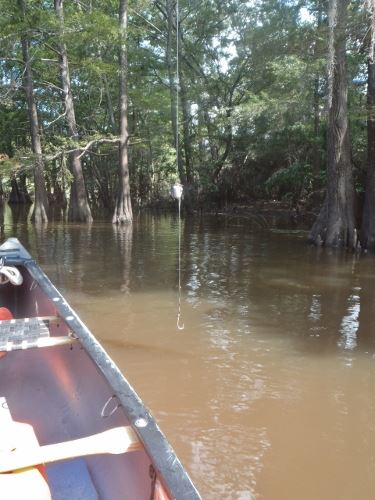Warning: Flying Fish Hooks!
November 2017
by John Rich
On a recent paddle trip on Whites Bayou on the east side of Houston, our group encountered a new and unusual hazard that one does not normally see: flying fish hooks!

(
Click photo to enlarge)
Well, they weren't really flying, but they were suspended in mid-air, right at about kayaker eyeball height above the water. And with the nearly invisible fishing line, the hooks seemed to be hovering in mid-air.
My first thought was that these were trot lines placed by fishermen during the recent high water caused by flooding, and when the water receded it left the hooks dangling in mid-air from their tree limb anchor points. I started to cut them down, but hesitated because it's illegal to cut trot lines. But that theory didn't make a whole lot of sense. Then it dawned on me that these were the result of casts made by fishermen from shore which just got caught up in the cypress trees growing up out of the water. Then, unable to retrieve their weighted and baited hooks, they had to cut their lines and abandon them.
There were four of these hazards hanging in a 100-foot area, just waiting to pluck out someone's eyeball as they paddle by without noticing. As human-powered boaters, we move slowly and should have time to discern such things, and maneuver to avoid them. But imagine being pushed along in fast-moving whitewater, or being on a motorboat moving along at higher speeds... Beware!
Several of us pulled out our knives and cut the lines to remove the dangling hazards. I don't recommend throwing these into the water, as the hooks and line would still pose a hazard for wildlife. On a previous trip at this same location, the paddlers found a turtle struggling with a hook embedded in it's shell, tangled in line, and they freed it. So, it's better to bring that fishing tackle back to shore and dispose of it properly where it will harm neither man nor beast.
 |
| The author, John Rich |